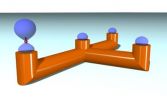(Press-News.org) Over the last two decades, nearly half of all initiatives that review and provide feedback to clinicians on healthcare practices show little to no impact on quality of care, according to a new study by Women's College Hospital's Dr. Noah Ivers.
The study, published in the Journal of General Internal Medicine, found only 28 per cent of all studies showed an improvement of at least 10 per cent in quality of care over a 25-year period.
"Research shows there is a gap between recommended practices and the care patients actually receive," said Dr. Noah Ivers, a family physician at Women's College Hospital and lead author of the study. "While we have a number of studies showing that providing feedback to clinicians can act as a foundation for improving quality of care if done properly, we found, in most cases, quality improvement efforts are haphazardly implemented, reinventing the wheel rather than learning from what we already know."
In the study, researchers examined 62 studies in the scientific literature and found feedback on healthcare practices was most effective when:
it is delivered by a respected colleague
it is repeated multiple times
it includes specific goals and action plans, and
it focuses on a problem where there was a larger scope for improvement.
When efforts to improve quality of care do not build on lessons learned from previous research, opportunities are wasted to improve outcomes for patients, the researchers said. Just as best evidence should be used to decide which treatment is the right choice for a certain problem, a scientific approach should be taken when figuring out ways to ensure that patients receive the right treatment every time, they add.
"New scientific studies that have tried to get clinicians to more consistently provide the right care for the right patients by providing them with feedback reports of their past performance have contributed little new knowledge on how to best do this so that it results in better outcomes for patients," Dr. Ivers noted. "While we know from previous research that providing clinicians with a specific action plan for improvement is essential for providing better care for patients, feedback initiatives rarely include plans aimed at changing the behavior of healthcare professionals."
INFORMATION: END
Fifty percent of quality improvement studies fail to change medical practices
2014-06-25
ELSE PRESS RELEASES FROM THIS DATE:
Fracking flowback could pollute groundwater with heavy metals
2014-06-25
VIDEO:
This video visualizes the effects of hydrofracking flowback fluid on colloid mobilization in unsaturated sand. Included are the injection of the colloids into the sand column at the beginning of...
Click here for more information.
ITHACA, N.Y. – The chemical makeup of wastewater generated by "hydrofracking" could cause the release of tiny particles in soils that often strongly bind heavy metals and pollutants, exacerbating the environmental risks during accidental spills, ...
LSTM Researchers demonstrate adaptive potential of hybridization in mosquito species
2014-06-25
Researchers from LSTM have exploited a natural experiment created by insecticidal pressure to determine how the most important malaria vectors - A. gambiae s.s. and A. coluzzii – respond rapidly to environmental change.
Working with genome analysis specialists from the Wellcome Trust Sanger Institute and field entomologists in Ghana, LSTM researchers sequenced the genomes of individual wild mosquitoes of each species from southern Ghana. The results, published in Nature Communications, reveal that transfer of a major insecticide resistance mutation (kdr) resulted in replacement ...
World's first magnetic hose created
2014-06-25
The magnetic hose designed by the researchers consists of a ferromagnetic cylinder covered by a superconductor material, a surprisingly simple design given the complicated theoretical calculations and numerous lab tests it had to undergo. A 14-centimeter prototype was built, which transports the magnetic field from one extreme to the other with a efficiency of 400% in comparison to current methods used to transport these fields.
Even with the efficiency of the prototype, researchers theoretically demonstrated that the magnetic hose can be even more efficient if the ferromagnetic ...
New method increases targeted bone volume by 30 percent
2014-06-25
In an important development for the health of elderly people, University of Liverpool researchers have developed a new method to target bone growth.
As people age their bones lose density and, especially in women after the menopause, become more brittle. The new method developed by researchers from the University's Institute of Ageing and Chronic Disease offers the possibility of more effective treatment than currently available.
Professor Jonathan Jarvis of Liverpool John Moores University designed miniature muscle pacemakers that were used in the University of Liverpool ...
Peer problem solving leads to operational efficiency
2014-06-25
Chestnut Hill, MA (June 25, 2014) - Strength in numbers may not just be a truism for those seeking moral and emotional support, but it also may be an avenue for those seeking customer support. New research shows peer-to-peer problem solving can lessen the need for firms to actually have to contact their supplier for a traditional customer support service call.
"This has never been shown before, this notion that people who have full-time day jobs handling support for their companies also take time to answer other people's questions, thereby significantly reducing their ...
Deep brain stimulation improves non motor symptoms in Parkinson's disease
2014-06-25
Amsterdam, NL, 25 June 2014 – Deep brain stimulation (DBS) has become a well-recognized non-pharmacologic treatment that improves motor symptoms of patients with early and advanced Parkinson's disease. Evidence now indicates that DBS can decrease the number and severity of non motor symptoms of patients with Parkinson's disease (PD) as well, according to a review published in the Journal of Parkinson's Disease.
"Non motor features are common in PD patients, occur across all disease stages, and while well described, are still under-recognized when considering their huge ...
Reproduction later in life is a marker for longevity in women
2014-06-25
(Boston)--Women who are able to naturally have children later in life tend to live longer and the genetic variants that allow them to do so might also facilitate exceptionally long life spans.
A Boston University School of Medicine (BUSM) study published in Menopause: The Journal of the North American Menopause Society, says women who are able to have children after the age of 33 have a greater chance of living longer than women who had their last child before the age of 30.
"Of course this does not mean women should wait to have children at older ages in order to ...
The lowdown on triclosan's effects on health and the environment
2014-06-25
Earlier this year, mounting concerns over the potential health effects of triclosan, a common antimicrobial ingredient, prompted Minnesota to ban the germ-killer from consumer soaps statewide starting in 2017. Are these concerns warranted? An article in Chemical & Engineering News (C&EN), the weekly news magazine of the American Chemical Society, investigates.
Jyllian Kemsley, a senior editor at C&EN, notes that when it was first patented, triclosan was used as an antimicrobial agent in health care settings. It was a much more benign option as a surgical scrub than the ...
New material improves wound healing, keeps bacteria from sticking
2014-06-25
As many patients know, treating wounds has become far more sophisticated than sewing stitches and applying gauze, but dressings still have shortcomings. Now scientists are reporting the next step in the evolution of wound treatment with a material that leads to faster healing than existing commercial dressings and prevents potentially harmful bacteria from sticking. Their study appears in the journal ACS Applied Materials & Interfaces.
Yung Chang and colleagues note that the need for improved dressings is becoming urgent as the global population ages. With it, health ...
Another concern arises over groundwater contamination from fracking accidents
2014-06-25
The oil and gas extraction method known as hydraulic fracturing, or fracking, could potentially contribute more pollutants to groundwater than past research has suggested, according to a new study in ACS' journal Environmental Science & Technology. Scientists are reporting that when spilled or deliberately applied to land, waste fluids from fracking are likely picking up tiny particles in the soil that attract heavy metals and other chemicals with possible health implications for people and animals.
Tammo S. Steenhuis and colleagues note that fracking, which involves ...

